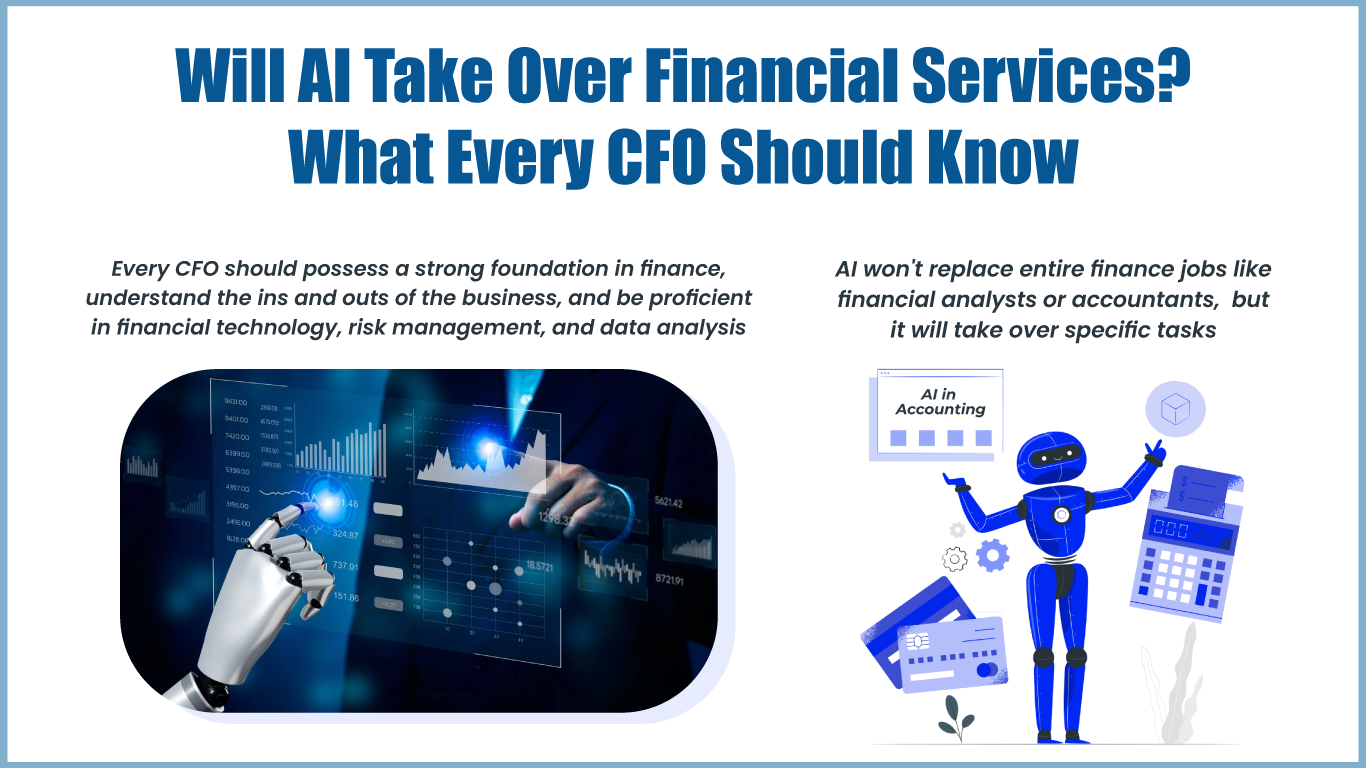Will AI Take Over Financial Services? What Every CFO Should Know
Artificial Intelligence (AI) is changing the world. It’s helping businesses work faster, smarter, and more efficiently. One of the industries seeing a big shift is financial services. From banks and insurance companies to investment firms and accounting teams, AI is becoming more involved every day.
So, will AI take over financial services completely? Not exactly—but it will change how work gets done. For CFOs (Chief Financial Officers), understanding this change is critical. Let’s explore what’s happening, whcat to expect, and what every CFO should know.
What is AI and How is It Used in Finance?
AI refers to machines or computer programs that can perform tasks that usually require human intelligence. These tasks include learning, problem-solving, understanding language, and even making decisions.
In finance, AI is already being used in several areas, including:
- Fraud detection
- Automated trading
- Customer service (chatbots)
- Credit scoring and loan approvals
- Expense tracking and reporting
- Forecasting and budgeting
Let’s look at a few examples.
Example 1: Fraud Detection at Banks
Banks like JPMorgan Chase and HSBC use AI to detect fraud. AI systems can scan thousands of transactions every second and flag any unusual activity. This helps protect both the bank and the customer from financial losses.
Example 2: Robo-Advisors
Companies like Betterment and Wealthfront use AI-based "robo-advisors" to help people invest money. These programs analyze data, assess risk, and recommend where to invest—without a human advisor.
Will AI Replace Humans in Finance?
AI will not completely replace humans in finance, but it will change many jobs.
What AI Can Do Well:
- Handle repetitive tasks
- Analyze large amounts of data quickly
- Work 24/7 without breaks
- Make predictions using patterns in data
For example, AI can go through thousands of invoices in minutes to spot errors or duplicates. This saves time and reduces mistakes.
What AI Cannot Do Well (Yet):
- Understand business context
- Make strategic decisions
- Communicate with empathy
- Adapt to complex or unexpected situations
That’s why AI should be seen as a partner, not a replacement. It can handle the routine stuff, so humans can focus on high-level thinking, strategy, and creativity.
What Should CFOs Do?
As a CFO, your job is to ensure financial health, reduce risk, and drive growth. AI can help with all of these—but only if you understand how to use it.
Here are five key things every CFO should know:
1. Start Small, Think Big
You don’t need to use AI everywhere all at once. Begin with small pilot projects like automating invoice processing or using AI to forecast cash flow. Once you see the results, you can expand.
Example: Use an AI tool to predict which customers are likely to pay late. This can help your team act early and reduce bad debts.
2. Choose the Right Tools
There are many AI tools available, from large platforms like Microsoft Azure and Google Cloud AI to specialized tools like:
- AppZen for expense auditing
- Kabbage for small business loans
- Chata.ai for finance-related data questions
Make sure the tools you pick solve real problems and are easy for your team to use.
3. Invest in Data Quality
AI depends on data. If your data is messy, outdated, or incomplete, the AI won’t work well. Make sure your company has clean, organized, and updated financial data.
Tip: Work with your IT team to set up proper data governance rules. Think of it like giving AI clean fuel to run on.
4. Upskill Your Team
AI won’t take your team’s jobs, but it will change them. Accountants and analysts will need to learn how to work with AI tools and interpret their results.
Example: An analyst who once made reports manually might now use AI to pull data and focus on giving insights instead.
Offer training, workshops, or even short courses to help your team get comfortable with these new tools.
5. Be Ready for Ethical and Legal Questions
AI in finance also brings new concerns. What if an AI system makes a wrong credit decision? Who is responsible?
As CFO, you need to work with legal and compliance teams to set clear policies. Make sure any AI tools you use are explainable, fair, and meet regulations like GDPR or financial conduct rules.
The Human-AI Partnership
AI is great at math and logic, but it doesn’t understand people or emotions. That’s where humans still lead.
For example, if a company is thinking of buying another company, AI can provide financial data and forecasts—but a human CFO must judge the risk, negotiate terms, and handle the emotions of employees and investors.
This partnership—human + machine—is the future of financial services.
Looking Ahead: What's Next for AI in Finance?
Here are some trends CFOs should watch:
- Predictive analytics: AI will help predict future revenue, expenses, and customer behavior more accurately.
- AI-assisted audits: External auditors may use AI to test entire datasets, not just samples.
- Real-time dashboards: CFOs will get instant updates on financial health, not just monthly reports.
- Hyper-automation: Combining AI, robotic process automation (RPA), and machine learning to automate more complex workflows.
AI will continue to evolve—and so will finance. Companies that embrace this change will be more agile, efficient, and competitive.
Final Thoughts
AI is not here to take over financial services—it’s here to transform them. For CFOs, the challenge is not to fight AI, but to lead its adoption wisely. Start small, focus on value, and bring your team along for the journey.
The future of finance is not just about numbers—it’s about smart decisions, driven by data and powered by AI.
Are you ready?
